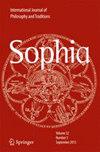维莱姆-弗卢瑟的 "异性伦理学 "之蜿蜒曲折
IF 0.5
3区 哲学
0 PHILOSOPHY
引用次数: 0
摘要
文章探讨了超越和情感责任这两个概念在捷克-巴西哲学家维莱姆-弗鲁瑟思想中的核心地位。在此基础上,文章概述了可被称为典型的弗鲁瑟 "改变性伦理学 "的一些错综复杂之处。在这一过程中,我们会发现,所有这些都让弗鲁瑟好奇地回到了黑格尔。回到黑格尔表明,任何关于他者经验的哲学尝试似乎总是要让这位施瓦本哲学家说了算。本文章由计算机程序翻译,如有差异,请以英文原文为准。
Meanders of Vilém Flusser’s Ethics of Alterity
The article considers the central place the ideas of transcension and affective responsibility play in the thought of the Czech-Brazilian philosopher Vilém Flusser. From this, it outlines some of the intricacies of what can be termed a typically Flusserian ethics of alterity. In the process, it will be revealed that all of this leads Flusser curiously back to Hegel. The return to Hegel indicates, among other things, that any attempt to philosophize about the experience of otherness seems always to give the Swabian philosopher the last word.
求助全文
通过发布文献求助,成功后即可免费获取论文全文。
去求助
来源期刊

Sophia
PHILOSOPHY-
CiteScore
0.60
自引率
0.00%
发文量
44
期刊介绍:
Sophia is now published by Springer. The back files, all the way to Volume 1:1, are available via SpringerLink! Covers both analytic and continental philosophy of religionConsiders both western and non-western perspectives, including Asian and indigenousIncludes specialist contributions, e.g. on feminist and postcolonial philosophy of religionSince its inception in 1962, Sophia has been devoted to providing a forum for discussions in philosophy and religion, focusing on the interstices between metaphysics and theological thinking. The discussions take cognizance of the wider ambience of the sciences (''natural'' philosophy and human/social sciences), ethical and moral concerns in the public sphere, critical feminist theology and cross-cultural perspectives. Sophia''s cross-cultural and cross-frontier approach is reflected not only in the international composition of its editorial board, but also in its consideration of analytic, continental, Asian and indigenous responses to issues and developments in the field of philosophy of religion.
 求助内容:
求助内容: 应助结果提醒方式:
应助结果提醒方式:


